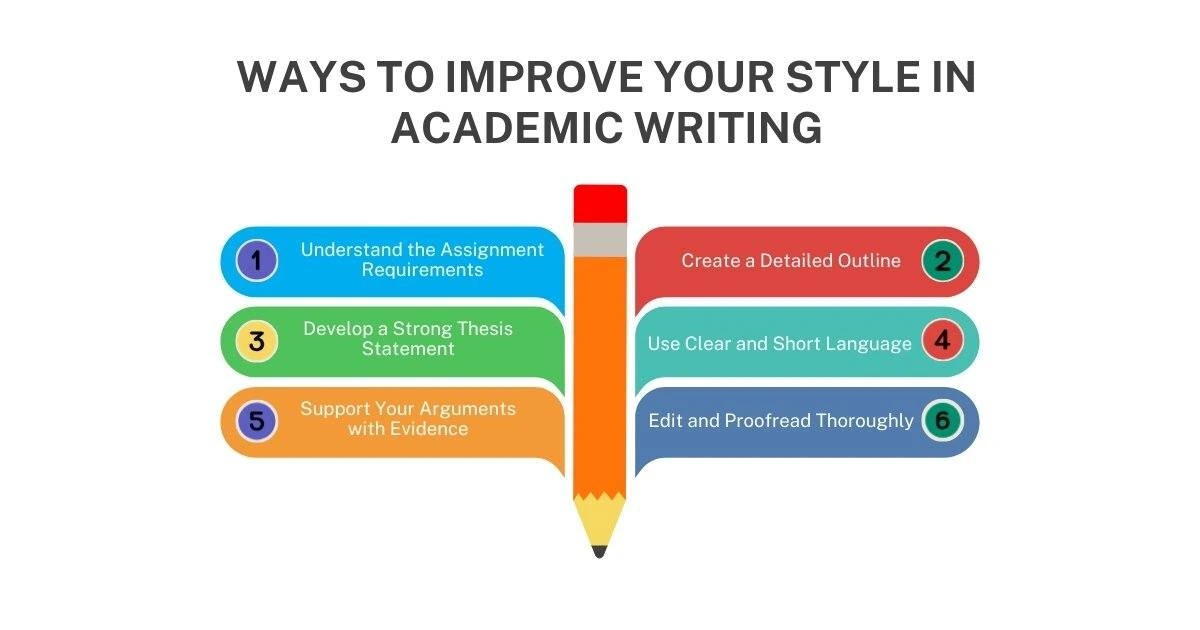How to Do a Hanging Indent in Word: Complete Guide for Students (2026)
Hanging Indent in Microsoft Word is a type of formatting style in which the first line of a paragraph has the left margi ...

Do you encounter so many challenges while academic writing? Surely, you want to capture the reader's attention from the first sentence and impress your professors with professional content so you will have to present your ideas with clarity.
In this article, we are going to reveal 13 Simple Ways to Improve Your English Academic Writing that will transform your academic writing from ordinary to exceptional. This article will be helpful for all cases whether you are looking for higher grades or to sharpen your skills for future endeavors.
Be ready to unlock the secrets to better academic writing. Let's dive in! How to write academic writing.

In a student's life, academic writing is a vital skill that involves presenting ideas, arguments, and findings in a structured manner. Good academic writing skills enhance one's ability to communicate effectively and contribute to the body of knowledge in a particular field. It is required for making essays, research papers, dissertations, Thesis, and other scholarly documents.
In professional work, strong academic writing skills can open doors to career advancement and opportunities for publication. So without taking your time, let's start the ways How to Improve Academic Writing.
Firstly, a student should understand the assignment requirements before starting the writing process because many students don't know How to write academic writing. Always make sure that you have clarity in your thoughts about whatever you are about to write. Ensure a clear perspective of the topic such as the required length and any specific instructions that are provided by your instructor. This is a foundational step that helps in creating a focused and well-structured paper.
As you understand the topic and its all perspectives that makes a roadmap for your writing that is called a detailed outline. It will help you to make your assignment or academic notes with many short tasks so that you can focus at one time on one thing. It also ensures your writing flows logically from one point to the next.
The outline should be created with an introduction and mention all your main points with a heading with a short description that helps to create your whole academic writing in a well-structured manner.
The outline should be followed by body paragraphs that elaborate your headings and conclude with a strong conclusion. One should always know How To Write an Assignment First Page Of An Assignment.
If you are about to write a thesis then the thesis statement is the central point of your whole research paper. Always make sure that you write a clear, concise, and specific thesis statement to make it strong. A strong thesis statement helps the readers understand the direction of your paper and help them understand the key point you are trying to tell your readers.
Always ensure that you write clear and short academic writing without using unnecessary words and complex sentences. Always focus on conveying your ideas in an understandable manner that makes your writing easier to read.
While writing your assignments, make sure that what arguments are being written by your hand, it should be written with evidence that supports your arguments. For writing evidence, you can use data, statistics, quotes from experts, and references to academic sources.
The evidence not only supports your arguments but also demonstrates your understanding of the topic to engage with relevant literature.
The most important step is to maintain a formal tone while writing an assignment. To adapt this tone, avoid colloquial language, contractions, and slang. You can use formal vocabulary and maintain a professional tone throughout your assignment. This step increases the quality of your work and it aligns with the academic standards.
When you are writing an assignment, during the process, editing and proofreading are crucial steps. To complete this step, always take the time to review and revise your work after completing your first draft, checking grammatical mistakes, and spelling errors. This action enhances the structured quality and verifies that your work is well-supported.
In academic writing, proper citation and referencing are a very important part. So you should always know How to Write References in Assignments & How to Write a Good Assignment Without Plagiarism.
Always ensure that you cite all sources in the proper way using the required citation style that is provided by your instructor. These citations not only give credit to original sources or authors but also help in avoiding plagiarism.
As the drafts are created, share them with your classmates and mentors and ask for feedback. It always provides valuable insights into your academic writing. Constructive feedbacks help to identify areas for improvement and refine the writing skills.
Academic writing is not only a one-time process. it is an ongoing process that can be done regularly to improve academic writing skills. Always write continuously, read academic papers related to your field, and seek to improve your writing skills. There will be a time after this process when you will become professional in academic writing and your ability will be able to produce high-quality academic papers.
The Writing Center offers many of the services you need, including writing tutoring, writing groups, writing classes and writing textbooks, vocabulary lists, and templates. You can take help of your teachers and also take help of your friends and books for writing your writings.
Writing skill is a skill that takes time to hone. If you write for 10-20 minutes every day, with a regular practice you can improve your skill. A book or a PhD thesis can be written from one paragraph every day.
Get into the habit of writing, no matter what you write, write about whatever you feel in your life, write about everything you do every day, write about the time you spend with your family, Write about what food you ate, where you went, every day. one paragraph can improve your writing skills.
Readers mostly avoid long sentences, they mostly like to read short sentences because they are short and easy to read. This cannot be done in the normal way so you will have to do this by crossing out big words. You have to write as if you are talking to someone, this will improve your writing ability.
Academic writing is a formal style of writing that is used in universities. It includes presenting ideas, research findings, references, structured, coherent manner, and arguments.
You can improve your academic vocabulary using academic word lists and practicing writing regularly. It helps build a strong academic vocabulary.
Citing references and authors' names gives credit to the original sources to verify the information and explore the topic further. It helps avoid plagiarism.
Without grammatical mistakes, any work makes it easier for readers to understand the content. Proper grammar enhances the quality and credibility of the writing.
A thesis statement is a clear and short summary of the main point of an academic paper. It provides the roadmap for the academic paper. It helps the reader understand its purpose and direction. It conveys the message to the reader.
1. First Set a Writing Improvement Goal. 2. Second, ask your friends and colleagues to give you feedback, so you will know your mistakes. 3. Make a diary of your own in which you can write, study how other people write.
Let's Book Your Work with Our Expert and Get High-Quality Content

Loved reading this Blog? Share your valuable thoughts in the comment section.
Add comment